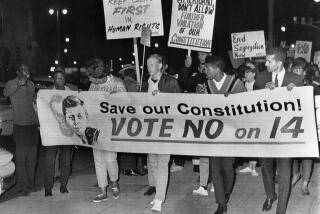The untrustworthy ways of politics
- Share via
Re “Not pure, not simple,” Opinion, Nov. 12
Bill Boyarsky glorifies Jesse M. Unruh, along with the notion that a legislator needs power to be effective, citing Unruh’s 1959 Civil Rights Act as evidence. (Did I mention that Fidel Castro’s got great healthcare?) He even quotes one of my heroes, Molly Ivins, to tell us that “getting power is usually ugly,” as if the ends justify the means. But where’s the guarantee that the ends won’t be ugly as well? As an example of that, we now have Proposition 93 on the February primary election ballot, the “Fabian Nunez Self-Preservation Act.” It is made possible by contributions from the healthcare industry and legislative favors to potential initiative opponents. Anyone need a definition of obscenity?
What democracy is all about is sharing power; thus our constitutional emphasis on checks and balances. Electing a king is easy. Unelecting one with today’s quiescent electorate is not, which is exactly why term limits are democracy’s best friend.
Terry De Wolfe
Monterey Park
--
Boyarsky’s piece about Unruh reminds me of an exciting time in California politics. Boyarsky raises two interesting points: that Unruh “accumulated enormous power in ways that would appall today’s reformers,” and that Unruh used his power to help people. I wonder if Unruh’s Civil Rights Act would have passed in today’s era of campaign and ethics reform. Reform does not always beget reform.
Steven Afriat
Sherman Oaks
More to Read
Get the L.A. Times Politics newsletter
Deeply reported insights into legislation, politics and policy from Sacramento, Washington and beyond. In your inbox twice per week.
You may occasionally receive promotional content from the Los Angeles Times.










